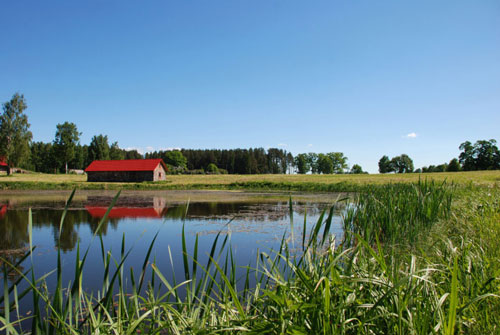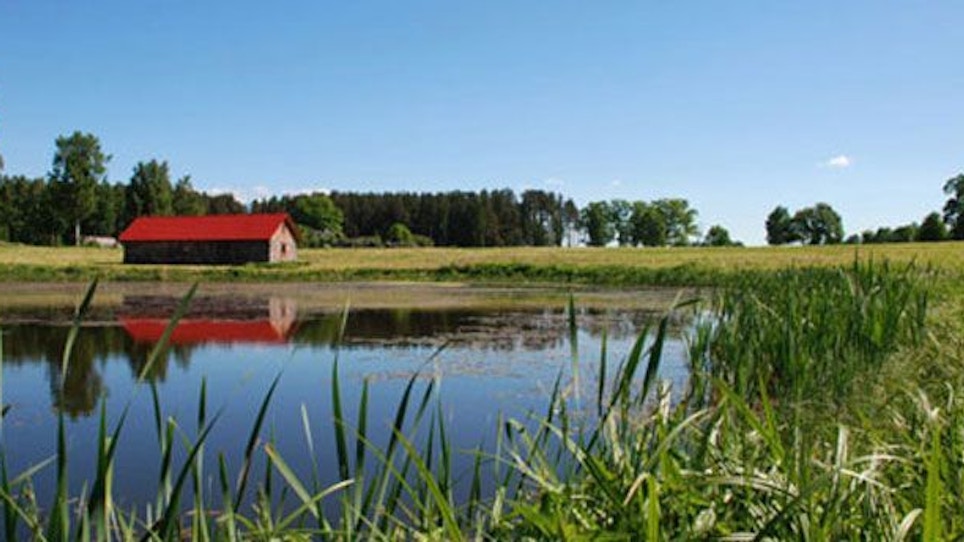 A few years ago, I pulled up to a muddy pond and wondered if it would be worthwhile to fish. Spring rains and a clay bottom had left the 3-acre waterhole in a turbid state — not really my kind of fishing spot. Being a fan of clearwater lakes and ponds, I have to admit I was skeptical to say the least. Harold, the landowner, soon joined me, and my education of pond management began.
A few years ago, I pulled up to a muddy pond and wondered if it would be worthwhile to fish. Spring rains and a clay bottom had left the 3-acre waterhole in a turbid state — not really my kind of fishing spot. Being a fan of clearwater lakes and ponds, I have to admit I was skeptical to say the least. Harold, the landowner, soon joined me, and my education of pond management began.
“Have you ever caught a 10-pound channel cat?” he asked. Suppressing the urge to fib, I answered, “Not lately.” “Well you are getting ready to,” he said with a wide grin.
Harold walked to the end of the nice boat dock he had constructed years earlier. Attached to a post was a black barrel that looked like a deer feeder. Harold adjusted the timer on the bottom of the barrel, and in a few moments small nuggets of food were broadcast into the water below.
The feeder’s golden-brown pellets, slightly larger than kernels of corn, floated across the rippling, red water. What happened next made a believer out of me. Suddenly, the water began to boil — reminiscent of a frenzied school of striped bass gorging themselves on shad — and the biggest channel catfish I have ever seen appeared at the surface and began to scarf down the fish feed.
Harold asked, “You did stop at that country store and buy the live nightcrawlers I told you to get, didn’t you?” I responded in a smart-alec tone, “Yes, and they were sure proud of them — they cost me an arm and a leg.” Harold replied, “Hurry and get your rod and rig up, before those catfish eat all the food and leave!”
He continued, “See, these catfish only weighed a pound when I stocked them a few years ago. You can see what happens when you use an automatic fish feeder every day. Some of those cats weigh close to 20 pounds.”
I rigged up and caught three trophy-sized whiskerfish in a few minutes’ time, and many more before running out of bait. I released all the catfish, much to Harold’s chagrin, and promised to return soon for more. As I drove home I contacted a few landowners with ponds that I fish, and explained why they needed to get a fish feeder, too!
Proper Nutrition Is Vital
Without a doubt, proper nutrition is vital for fish and other creatures inhabiting ponds and other waters. In fact, for fish to grow and thrive, they need a protein-rich diet. Sadly, with some parts of the United States in the throes of a long-term drought, fish and other wildlife have suffered greatly. As a result, some fish I caught recently appeared to be in an emaciated condition.
For the overall health of a pond, fish have to have protein and vitamins to live and grow. Smaller fish even require more protein in their growing cycles. Protein requirements will differ due to water sizes and quality.
Fish feeders are outstanding management tools that will improve the quality of any fishery. Simply put: fish benefit in many ways from supplemental feeding. They get the necessary protein to grow healthy weights. They put on weight faster than fish that aren’t being fed. By having the right mix of protein and minerals in their daily diets, fish bolster their immune systems and are strengthened.
Fish Feeding Considerations
Before using a fish feeder, contact your local wildlife department to check the regulations. Though most states allow automatic fish feeders, it is wise to check before using one.
Experts suggest using a quality fish food, and not feeding more than 10 pounds of food per acre. Choose a feed that will biodegrade quickly to prevent future issues with algae blooms — an aquatic virus that will kill all the fish in an area. Excessive or over-feeding can also be detrimental to the pond’s ecosystem by causing oxygen depletion and water quality problems. Never use hog pellets or dog food as a fish food. Though the cost of these other feeds is more economical than commercial fish feeds on the market, they are not digested well by most fish and can harm their delicate digestive systems.
There are two types of fish food: floating and sinking. Most experts suggest using the floating variety so you can visually observe the results of the food being eaten and not wasted.
Supplemental fish food should be stored in the original bags or in an air-tight container, out of direct sunlight. Since fish feed contains both proteins and vitamins, it is advised to pick a cool shaded place for storage. Make sure to discard any feed with mold or mildew, and never keep commercial fish feed stored for longer than three months.
Most biologists caution not to feed fish in the winter months. Due to the metabolism rates being slower during this time, fish do not have to eat as often. During the cold periods fish tend to be more reliant on crustaceans and smaller fish for sustenance.
Choosing A Pond Fish Feeder
Today there are a number of quality fish feeders on the market. Companies like Moultrie carry a complete line of feeders to meet the needs of wildlife conservationists alike. Insist on buying a feeder that is well-built, carries a good warranty, and is easy to operate.
While some feeders can only be set to feed a couple of times each day, Moultrie’s 30-gallon Feedcaster Pro can be set to feed up to six times a day, and you can set the dispense time from 1 to 20 seconds. This feeder throws feed out to 20 feet away, thanks to its narrow directional casting feature.
Using a quality fish feeder is a great way to practice proper pond management. It allows you to take an active role in the health and quality of your fishing-hole. Fish that are fed supplemental feed are healthier and a joy to catch.
Remember, feeders make fishing a pond more fun, especially when you are trying to introduce youngsters or new anglers to the sport of fishing. They can almost be guaranteed to have a successful day, and then most will be hooked for life!






